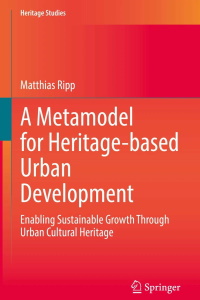
Matthias Ripp, 2022
This book proposes a Metamodel for heritage-based urban development, based on urban morphology, governance theory, and the metamodeling concept of John P. Van Gigch. Building on international policies such as the 2011 Recommendation for Historic Urban Landscapes and the results of the 2016 Urban Habitat III Conference, cultural heritage is now regarded as a potential resource for sustainable urban development. While more and more evidence of the potential benefits of cultural heritage for sustainable development has been published, this book is the first to develop and design a Metamodel that can be universally applied in a wide variety of settings. The Metamodel was developed using grounded theory and the design research methodology and is based on three successful case-models from European contexts. The book includes three application scenarios that elaborate how the metamodel can be used to design, evaluate, and improve processes where cultural heritage is a starting point for sustainable urban development.
Download: Flyer
Published in 2022.
This Book on springer.de: https://link.springer.com/book/10.1007/978-3-031-08238-2
The complete Series “Heritage Studies Series“ on springer.de.
TABLE OF CONTENTS
1. Introduction
Part 1 Contextual Background: Problem, Theories, Methods and Research Design
2. Problem, Hypothesis and Research Questions
3. Theoretical Background
4. Disciplinary Approach
5. Proposed Solution and Mixed-Methods Research Design
6. Epistemology and Integrating Metamodeling Theory into the Research Design
Part II Application of Research Methods
7. Research Methods
Part III Description, Application adn Demonstration of the Metamodel
8. Description of the Metamodel
9. Application of the Metamodel
10. Demonstration
11. Condensed Resume
More from Heritage Studies Series
- Announcement: Cultural Heritage Protection in Korea – Contents of Law and Policy and their Changes in Relation to International Conventions
- Claiming Back Their Heritage: Indigenous Empowerment and Community Development through World Heritage
- Dance Practices as Research – Approaches to the Safeguarding and Transmission of the Intangible Cultural Heritage of Dance
- 50 Years World Heritage Convention: Shared Responsibility – Conflict & Reconciliation
- Intangible Cultural Heritage and Sustainable Development: The Valorisation of Heritage Practices
- The UNESCO Memory of the World Programme: Key Aspects and Recent Developments
- Going Beyond – Perceptions of Sustainability in Heritage Studies No. 2
- Perceptions of Sustainability in Heritage Studies
- 40 Years World Heritage Convention
- Understanding Heritage
